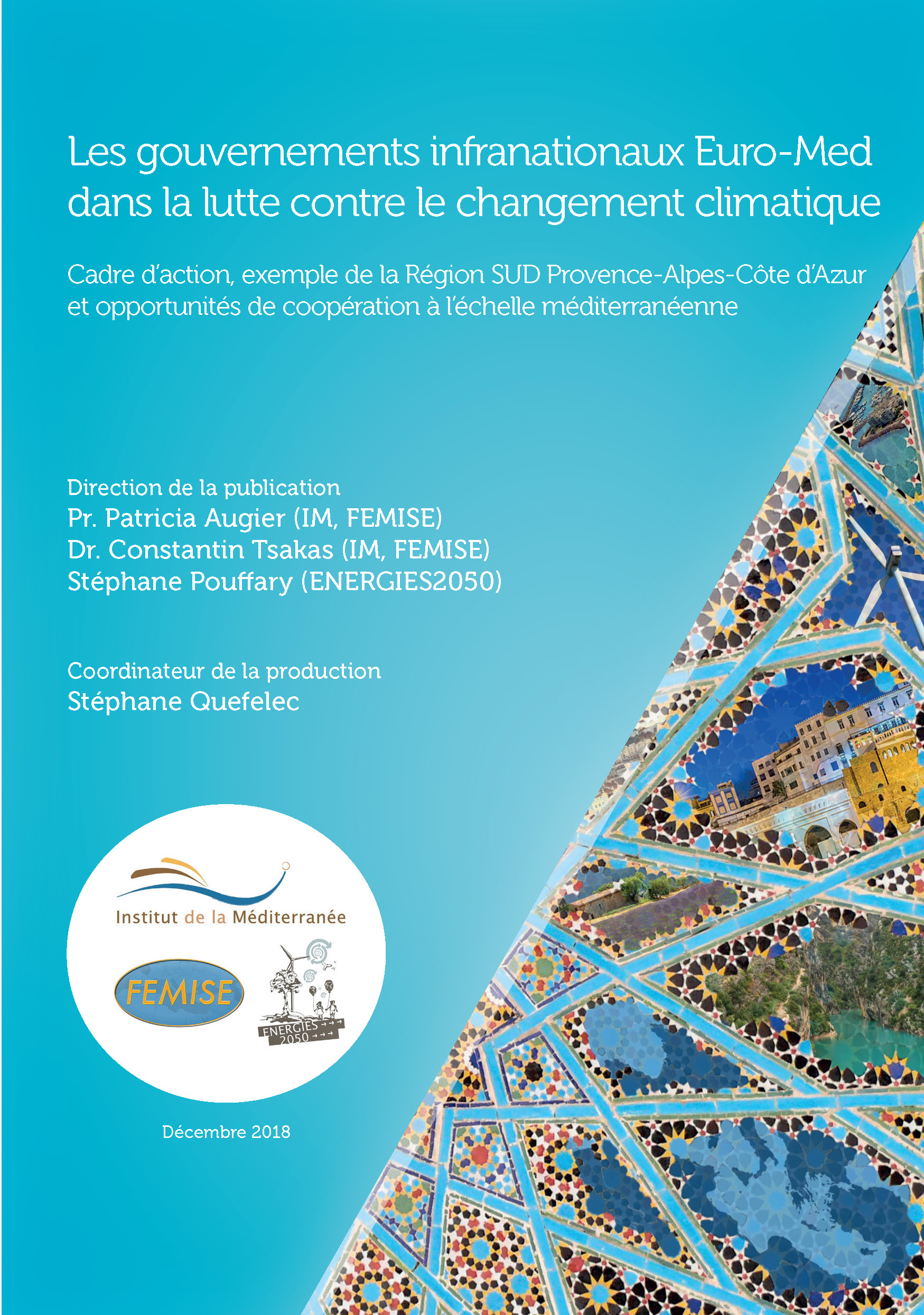FEMISE is pleased to announce the publication of the report on “Euro-Med sub-national governments in the fight against climate change: a framework for action, an example of the SUD Provence-Alpes-Côte d’Azur Region and opportunities for cooperation at the Mediterranean scale.
The report (in french) is available for download by clicking here.
Press Release
December 7, 2018 – Report release
By INSTITUT DE LA MEDITERRANEE and its partners, FEMISE and ENERGIES2050
INSTITUT DE LA MEDITERRANEE (IM)[1] and its partners, FEMISE and association ENERGIES2050, announce the publication of the final version of the report on “Euro-Med sub-national governments in the fight against climate change: Framework for action, example of Région SUD Provence-Alpes-Côte d’Azur and opportunities for cooperation at the Mediterranean level “
This report, articulated in three chapters, offers a photograph of the initiatives and dynamics undertaken by Région SUD (France) in the fight against the effects of climate change and also fits within the framework of the great Euro-Mediterranean cooperation.
The first chapter deals with the “Framework for action of the Mediterranean territories of Europe in the face of climate change“. It underlines that subnational governments face many challenges in implementing an ambitious and integrated climate action. Issues of access to finance, capacity to design strategies adapted to territorial issues, relying on local data, action monitoring (MRV) and the need for support and framing from higher echelons of governance are crucial.
The second chapter deals with “The territorial response to climate issues in the Mediterranean: the example of the Région SUD“. The report notes that the action of local authorities, in France in general and in the Région SUD in particular, benefits from an incentive and coherent legal framework, which is supported by regional information systems provided. In accordance with the policies adopted at the national level, the communities of Région SUD have engaged in the implementation of integrated climate strategies in the form of PCET (Climate Territorial Energy Plans) and then PCAET (Climate Air Energy Territorial Plans). Beyond this process, there is a proliferation of initiatives aimed in particular at better involving all actors in climate action. However, the transparency of the results of these actions remains relatively weak.
The third chapter covers the theme of “Cooperations, territories and climate at the scale of the Mediterranean basin and beyond” and offers many tracks for reflection for the future. One of the first reflections revolves on placing the climate / territory issue at the center of the Euro-Mediterranean cooperation strategy. Région SUD could bring valuable feedbacks. In addition, a platform at the service of territories in this area offering the possibility to capitalize, to exchange, to train, to allow a dialogue with the world of regional statistics and to offer technical assistance could be supported at the regional level, in particular through emerging initiatives such as the Mediterranean House of Climate.
The growing involvement of the private sector could also generate relevant initiatives. Proposals for action on Euro-Mediterranean cooperation could include the creation of an “ERASMUS of social and environmental entrepreneurship” and a Mediterranean Initiative for Social and Environmental Finance, aligning business creation and capital flows with the objectives of reducing local social and environmental externalities.
This report is rooted in IM’s willingness to mobilize its network and partners to contribute to debates on a shared commitment to climate issues. It is also part of the follow-up on the background work on climate and territorial issues that has been carried out for years by ENERGIES 2050, particularly in the context of the development and implementation of low-carbon territorial strategies. In view of the follow-up given to the international event “Mediterranean of the Future”, organized by Région SUD (21 November 2017, in Marseille), IM, FEMISE and ENERGIES 2050 believe in the unifying capacity of our territory on these issues. This report also builds on the momentum generated by the workshop “Climate change in a Mediterranean in transition” (May 15, 2018, Marseille, co-organized with the Departmental Council of Bouches-du-Rhône), which allowed to illustrate territorial solutions for climate challenges in the Euro-Mediterranean region. The effective support of the Departmental Council of Bouches-du-Rhône has reinforced a real multi-stakeholder movement that has only strengthened this relationship. Exchanges with the services of the City of Marseille, particularly on issues of sustainable development and engineering of local governance, were also valuable.
This report is intended to become a regular publication.
It is available by clicking here.
It is also available on the website of ENERGIES2050.
For more information, please contact:
IM / FEMISE: Dr. Constantin Tsakas, General Manager of Institut de la Méditerranée, General Secretary of FEMISE c.tsakas@femise.org – + 33 (0)4 91 31 51 95 www.femise.org
ENERGIES 2050: Stéphane POUFFARY, General Manager of Association ENERGIES 2050 – stephane.pouffary@energies2050.org – +33 (0)6 80 31 91 89 www.energies2050.org
![]() This report was funded by IM, developed with the financial support of the European Union under the EU-FEMISE contract on “Support to Economic Research, Studies and Dialogues of the Euro-Mediterranean Partnership”. The content of the publication is the sole responsibility of the authors.
This report was funded by IM, developed with the financial support of the European Union under the EU-FEMISE contract on “Support to Economic Research, Studies and Dialogues of the Euro-Mediterranean Partnership”. The content of the publication is the sole responsibility of the authors.
[1] Founded in 1994 by the Regional Council Provence Alpes Côte d’Azur (PACA), the General Council of Bouches-du-Rhone, the City of Marseille, the Chamber of Commerce and Industry Marseille Provence



